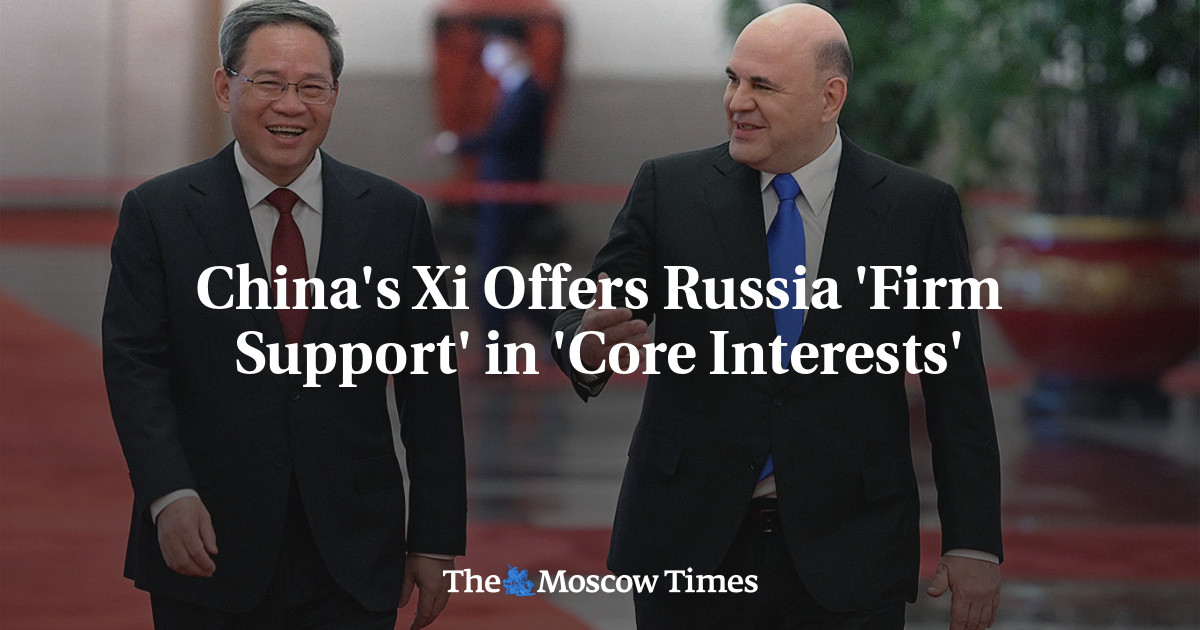
Chinese President Xi Jinping offered Beijing’s support on Moscow’s “core interests” at a meeting with Russian Prime Minister Mikhail Mishustin on Wednesday.
China and Russia have in recent years ramped up economic and diplomatic cooperation, growing even closer since Moscow’s invasion of Ukraine despite Beijing’s insistence that it is neutral in that conflict.
Mishustin’s trip this week is the highest-level visit by a Russian official to China since last year’s invasion of Ukraine.
Xi told Mishustin China and Russia would continue to offer each other “firm support on issues concerning each other’s core interests and strengthen collaboration in multilateral arenas,” according to a readout by the official Xinhua news agency.
China and Russia should “push cooperation in various fields to a higher level,” he said, and “raise the level of economic, trade and investment cooperation.”
Mishustin also met with Premier Li Qiang on Wednesday, saying that “relations between Russia and China are at an unprecedented high level” following a grand welcoming ceremony outside Beijing’s Great Hall of the People.
“They are characterized by mutual respect of each other’s interests, the desire to jointly respond to challenges, which is associated with increased turbulence in the international arena and the pressure of illegitimate sanctions from the collective West,” he said.
Li, in turn, hailed the “comprehensive strategic cooperative partnership between China and Russia in the new era.”
China is Russia’s largest trading partner, with trade between them reaching a record $190 billion last year, according to Chinese customs data.
Li said bilateral trade had already reached $70 billion so far this year.
“This is a year-on-year increase of more than 40%,” he said.
“The scale of investment between the two countries is also continuously upgrading,” Li said. “Strategic large-scale projects are steadily advancing.”
Ministers from the two countries signed a series of agreements after the talks on service trade cooperation and sports, as well as on patents and Russian millet exports to China.
China’s upper hand
Mishustin is accompanied this week by top officials including Deputy Prime Minister Alexander Novak, who handles energy policy.
China last year became Russia’s top energy customer as Moscow’s gas exports otherwise plummeted due to a flurry of Western sanctions over the invasion of Ukraine.
And Novak told a Russia-China business forum in Shanghai on Tuesday that Russian energy supplies to China would increase by 40% year-on-year in 2023, Moscow’s state media reported.
Analysts say China holds the upper hand in the relationship with Russia, and that its sway is growing as Moscow’s international isolation deepens.
The leaders of both countries are “brought together more by shared grievances and insecurities than by shared goals,” Ryan Hass, a senior fellow at Washington’s Brookings Institution and a former White House official, told AFP.
“They both resent and feel threatened by Western leadership in the international system and believe their countries should be given greater deference on issues implicating their own interests.”
In February, Beijing released a paper calling for a “political settlement” to the Ukraine conflict, but Western countries said it could enable Russia to hold much of the territory it has seized.
Xi invited Russian President Vladimir Putin to visit Beijing during their summit in Moscow in March.
Leave a Reply